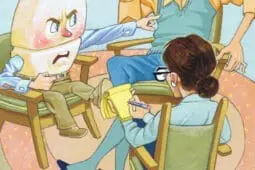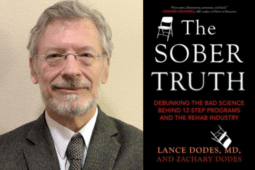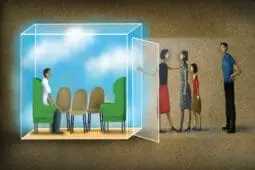Clinical Skills & Experience
Escaping the Trance of Depression
Three Techniques of Acknowledgement and PossibilityBecause depressed clients repeat the same thoughts, feelings, and experiences over and over again, successful treatment breaks clients out of this trance. Read more
Cure or Control?
Depression as a Chronic ConditionEvidence continues to accumulate that many people with depression suffer bouts of it all their lives, even after a good response to therapy. So what if we give... Read more
The CBT Path Out of Depression
Two Perspectives on How It WorksWhile widely acknowledged to be the most empirically supported therapy ever invented, cognitive behavioral therapy (CBT) is often criticized for being too... Read more
The Power of Small Changes
A Step-by-Step Approach to Treating Depression: An Interview with Judith BeckRelapse prevention begins in the first session, when we tell clients that we want to help them become their own therapists. Read more
The Power of How
Helping Depressed Clients Make Better Choices: An Interview with Michael YapkoOne of the most useful ways of understanding depression is the stress generation model, based on the idea that depressed people need better skills and... Read more
Enduring recovery from obsessive compulsive disorder means riding out the demands of an inner bully. Read more
Get Out of My Life!
Working with Cut-off Family Members in the Consulting RoomHelping families heal cutoffs is painstakingly delicate work, with a high risk for stumbling over buried land mines. Read more
Rocking On!
From grief to rebirthA daughter marvels as her mother goes from grief to an exuberant rebirth. Read more
The Tribal Classroom
Applying attachment theory in schoolsLou Cozolino believes that attachment theory and neuroscience may offer the key to transforming our troubled educational system. Read more
Side By Side
No creative artist is an islandAn investigation of some of history’s most famous creative teams leads to the conclusion that no artist is an island. Read more
The Rise of the Two-Dimensional Parent
Are Therapists Seeing a New Kind of Attachment?We used to think that disordered attachment was the result of early parental neglect or abuse. But today, has a paradoxical mix of parental overinvolvement and... Read more
Getting Unhooked
Connecting with Traumatized Kids Who Push Your ButtonsMost parents “loan” children their adult regulatory system beginning at birth. But developmentally traumatized teens have missed out on this opportunity... Read more
The Power of the Pen in Therapy
Some Journaling Exercises to Enhance Your WorkSome guidelines for bringing the creative power of therapeutic journaling into your work. Read more
What Makes Fanatics Tick?
Exploring the Psyches of People on the FringeA new book investigates the worldview of a range of fanatics who’ve dedicated their lives to holding onto to their antiscientific and antihistorical claims. Read more
Falling in Love Again
A Brief History of Psychoactive DrugsOver the last 150 years, we’ve seen waves of mass infatuations with psychotropic drugs—antidepressants being the latest. While all these drugs are... Read more
Beyond Chemistry
Exploring Our Relationship with Our MedsThe chemical effect of psychoactive meds is only part of their impact. In fact, people often develop complex relationships with the pills they take. Read more
The Meds of the Future
Waiting for the Next Magic PillDoes our growing understanding of the brain and the prospect of further scientific discoveries mean there’s a new generation of magical pills on the horizon? Read more
SSRIs in Perspective
Have They Lived up to Their Promise?After wading through the controversies and contradictions in the research literature on SSRIs, a critic of Big Pharma explains why he thinks these drugs may... Read more
Letting Go of Hate
How to help clients change unconscious responsesMany well-intentioned therapists have suggested that their clients just “let go” of hate, as if it were a heavy load that they could simply drop to the... Read more
When Talk Isn’t Enough
Easing Trauma’s Lingering ShockPioneering trauma expert Bessel van der Kolk shares his thoughts on the differences between public and private trauma. Read more
Neuroplasticity Isn’t Always for the Best
Why Therapists Should Know about the Plastic ParadoxPsychiatrist and author Norman Doidge believes that while the brain has an astonishing capacity for change, brain plasticity doesn’t always work out for the... Read more
VIDEO: Assessing the Unintegrated Brain
How to Change the Brain in TherapyIt’s one thing to throw around the scientific-sounding language of brain science, it’s another to actually develop concrete clinical procedures based on... Read more
Putting the Pieces Together
25 Years of Learning Trauma TreatmentTwenty-five years ago, we believed that helping trauma survivors dig into dark and unspeakable horrors would set them free. But in this new age of trauma... Read more
The Case for Neurofeedback
Rewiring the brain in the consulting roomThe increasing popularity of neurofeedback is based on the growing evidence that a wide variety of psychological disorders can be understood as firing mistakes... Read more
Rush to Judgment
Beware of the ADHD diagnosisPart of the epidemic of misdiagnosed ADHD in young children today results from a failure to understand how trauma often leads to difficulty learning in school. Read more
12 Missteps?
The evidence that AA works is many steps behindThe authors of a provocative new book argue that, despite its sterling reputation, alcoholics anonymous has one of the worst success rates in all of medicine. Read more
Editor's Note - May/June 2014
Trauma, the alluring diagnosis of the therapy profession.No other single condition tests the therapeutic relationship quite so stringently, demands so much from the clinician, or combines so many disparate treatment... Read more
Outside the Box
Bringing Families into Trauma TreatmentIf we don’t open up the one-on-one therapeutic cloister, trauma sufferers may never learn how to engage in the give and take of real-life relationships. By... Read more
When Victims Victimize Others
Some Clients Challenge our Capacity for CompassionMost therapists find it relatively easy to feel empathy for the usual hyperaroused, vulnerable trauma client. But it can be a lot tougher to remain... Read more






























